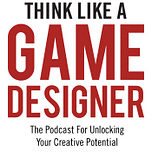About Dominic
Dominic Crapuchettes is the founder of North Star Games and the designer of massive hits like Wits & Wagers, Say Anything, and the Evolution series—games that have collectively sold over 4.5 million copies. In this episode, Dominic opens up about the rise and fall of North Star, from building a 30-person team and landing six SKUs at Target, to watching the company go bankrupt and eventually buying it back. He shares what he’s learned from those hard-won lessons, including how to build frothing fan communities, how to design with audience constraints in mind, and why brand and hook matter as much as gameplay. We also dive into his most ambitious project yet: Nature, a new modular game system launching at Gen Con that aims to bring the magic of collectible games to families and casual players alike. Whether you're a founder, designer, or someone trying to follow your passion while staying afloat, this is an episode you won’t want to miss.
Ah-ha! Justin’s Takeaways
Success Doesn’t Make You Bulletproof: Even after selling over $60 million worth of games, Dominic’s company still collapsed. That hit hard. There is no level of success that insulates you from failure. Leadership challenges, bad hires, or strategic missteps can still take everything down. But what matters most is what you do next. Dominic didn’t give up. He bought the assets, rebuilt from scratch, and made something better. I’ve been through my own version of this—it’s a conversation reminded me just how common and survivable those dark moments can be.
Build the Game They Need, Not Just the One You Want: Dominic wasn’t designing for himself; he was designing for “Target Moms.” That meant fast play, easy rules, low setup time, and portability. When we’re designing, we often default to our own preferences, but true creative impact starts with understanding your audience: their life, their time, their constraints. Whether it’s busy parents, mobile gamers, or hardcore hobbyists, knowing who you’re building for is what makes a good idea great. As I’ve said before, when it comes to game design the most important metric is player experience.
Brand Get You In the Door. Mechanics Make You Stay: Great gameplay doesn’t sell a game. It’s what keeps players coming back. What sells a game, especially in year one, is branding. A compelling hook, a clean pitch, a strong identity. That’s what grabs attention and drives early sales. But if the game isn’t good, it won’t last. Wingspan wasn’t just a hit because it was fun. It was a thing. That combination is what we’re all aiming for. As Dominic put it, branding drives year one and mechanics drive year five.
Show notes:
“I think about who's the audience and how does it fit into their lives and what are the needs that we're meeting to those people.” (00:08:06)
Dominic describes the most overlooked parts of design: knowing who your game is for. Whether it’s a mom juggling three kids or a group of hobby gamers in a basement, every game serves a different lifestyle. Designing with those constraints in mind doesn’t limit you—it opens the door to smarter, more focused creative choices.
“I always looked at business people as bad and superficial.” (00:19:48)
Dominic opens up about his early aversion to business, shaped by a mission-driven upbringing. Over time, he reframed business as a tool for doing good and sharing creative work. Dominic’s story is a great reminder that making awesome games isn’t just about creativity or business; it’s about learning to balance both. The magic happens when you stop seeing art and commerce as enemies and start treating them as partners.
“He had worked for five years at a retail game store... but I hired them to be a salesperson. And they weren’t.” (00:37:44)
Dominic shares a candid mistake about hiring the wrong person for the wrong job. He underscores the importance of aligning actual skills (not just adjacent experience) with the responsibilities of the role. It’s a valuable lesson in how mismatched expectations can hurt both sides.
“I am trying to create a lifestyle game with a gateway center that can bring families in.” (00:58:59)
Dominic introduces Nature, his most ambitious project yet, a modular game that starts as a simple, family-friendly experience and slowly expands into something deeper. It’s his answer to Magic: The Gathering, built to capture the same sense of discovery without the barriers that kept so many people out. It means the game is designed to evolve as players do: starting simple, then unlocking deeper layers as they’re ready. It’s a smart way to keep players engaged and invested without overwhelming them from the start.














Share this post